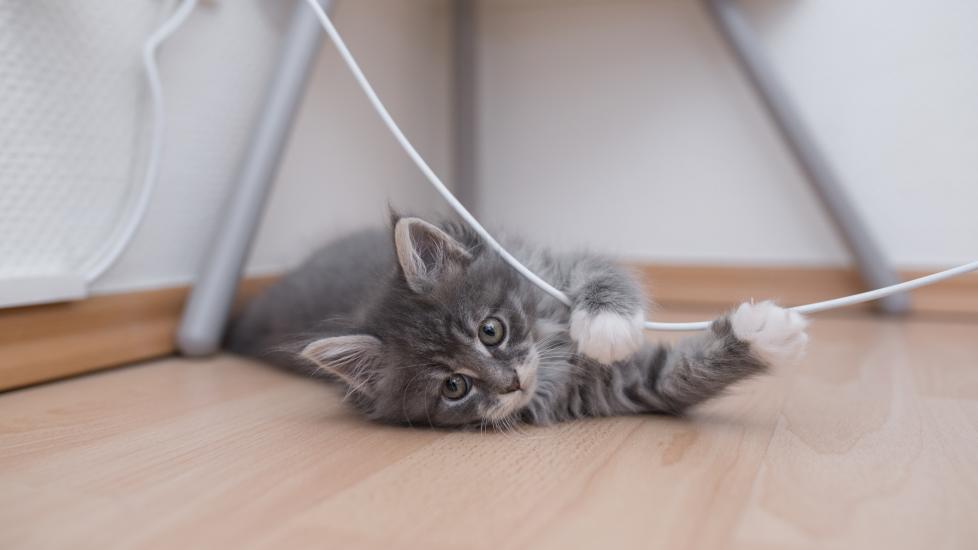How to Stop Cats From Chewing on Cords
Like scratching and kneading, chewing is a normal behavior in cats. And while some cats tend to chew more than others, all cats chew at some point during their lives.
Without safe outlets for expressing this natural behavior, cats may turn to chewing electrical cords in the home, which can lead to electrical burns, even electrocution, and choking or obstructions in the gastrointestinal tract.
Why Does My Cat Chew on Everything?
While electrical cords are one item chewed by cats, they may also commonly chew on wood, string, wool, plastic, and rubber. Cats may chew for a variety of reasons:
-
Chewing can be a way for cats to explore their environment because the taste, texture, and odor of items they encounter may be enticing to them.
-
Chewing provides mental stimulation for domesticated cats as they express natural instincts left over from ancestral cats tearing and chewing meat from prey.
-
Boredom, stress, or the behavior disorder pica can all cause cats to seek out inanimate objects to consume. An iron deficiency can also cause cats to seek out wires to chew.
-
Dental disease and gum pain may lead to chewing behavior in cats.
-
Cats who were weaned too early as kittens show a tendency to chew and suck on objects in their environment.
-
More anxiety-prone cat breeds, such as Siamese and Burmese cats, may be more likely to display excessive chewing behavior and compulsive disorders.
Why Do Cats Chew on Cords?
Electrical cords are particularly attractive to cats because:
-
The insulating material around the cords may include something that smells interesting to cats.
-
Cats prefer chewing materials that are slightly softer than bone, and the coating around cords has a semi-firm texture that cats enjoy.
-
The way electrical cords twist and curl when cats play with them resembles prey animals like snakes that the ancestors of domestic cats would hunt in the wild.
-
Stalking, pouncing, and biting on electrical cords thus allows cats to complete the natural hunting sequence that is an essential part of their being.
-
How To Stop Cats From Chewing on Cords
Deterring cats from chewing on cords often requires addressing the root cause of the behavior. The first step is to work with your veterinarian to rule out any medical causes of undesirable chewing behavior, such as hyperthyroidism, pica, dental disease, or nutritional deficiencies.
Identifying and reducing any source of stress, anxiety, and boredom in cats with compulsive chewing behaviors is also important. You can do this by enriching your cat’s environment:
-
Provide appropriate items for your cat to chew on, like dental chews and cat-specific chew toys.
-
Set up elevated perches for your cat to observe the outdoors.
-
Spend quality time interacting with your cat. You can use wand toys, or pet or brush them.
Anxious cats may benefit from behavioral supplements, such as Purina® Calming probiotic powder or Feliway® pheromone diffuser. These can help curb their undesirable chewing behavior, and make them more receptive to positive reinforcement techniques such as treats and praise for directing their chewing behavior toward more desirable outlets.
Some cats may also need prescription-strength anxiety medications such as fluoxetine or sertraline. It is important to work with your cat’s primary veterinarian to determine the best treatment plan for them if their cord-chewing behavior is related to an anxiety condition.
On a more basic level, restricting access to electrical cords can resolve most cord-chewing behaviors in cats. Opt for cordless electronics when possible, or use cord protector products such as the SunGrow® Anti Chew Split Wire Cord Protector. You can also wrap the cords with a product like Andover Healthcare® PetFlex Bitter No Chew Bandage.
Be especially diligent during the holiday season, when there may be more electrical cords than usual in the household.
Can Chewing on Cords Injure My Cat?
As previously discussed, there are multiple health hazards associated with cord chewing in cats:
-
Pieces of insulating material or wire can be swallowed and cause an intestinal blockage that may lead to a dangerous condition called intussusception. This occurs when the intestines fold abnormally, resulting in inflammation and potential necrosis (tissue death).
-
Chewing on exposed electrical wires can cause burns and injury to the mouth.
-
Cord chewing can cause cats to be electrically shocked, which can lead to heart arrhythmias, fluid in the lungs, decreased energy, seizures or tremors, and even collapse or death.
These serious risks make it essential to protect your cat around electrical cords and intervene immediately when undesirable chewing behaviors begin.
Electrical cords are everywhere in today’s households. Keep your cat safe by directing their natural behaviors toward more appropriate outlets like dedicated chew toys and dental chews, providing adequate mental stimulation, and working with your veterinarian to address any medical or psychological conditions.
Featured Image: Nils Jacobi/iStock via Getty Images
